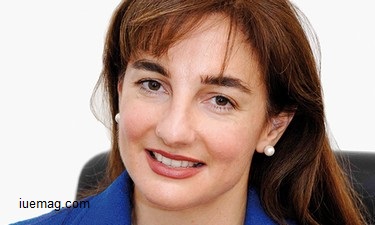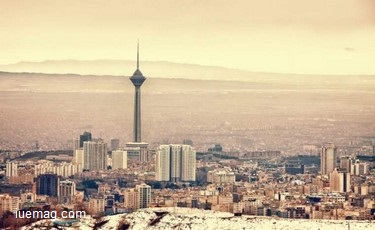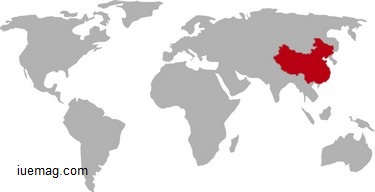

Special Features
A collection that's special to our readers, contributors and us especially for special news.

Ad
The Iran Nuclear Deal, The Syrian War and China's Emerging Role in the Middle East
From one of the leading independent research firms specialising in economic and market studies on Middle East & North Africa, Dr Eid-Oakden gives us her opinion about the developments in the region.
The CEO and Chief Economist of Arabia Monitor, speaks to Ellen Comberg, Chairwoman of the Advisory Board of the Global Female Leaders Summit in sharing her views and expertise. As a member of the summit’s advisory board herself, Dr Eid-Oakden has been involved with the summit from its inception in early 2014.

1. What risks, if any, does the Nuclear Deal with Iran pose on neighbouring countries?
We expect the nuclear deal to remove - for now - the risk of armed conflict relating to Iran’s nuclear programme. But we also expect to see an exacerbation of proxy wars across the Saudi-Iranian rivalry, while doing little to address the security challenges caused by the collapse of state authority (in places like Syria), erosion of borders and spread of non-state actors like ISIS across many parts of the region. A prolongation of these proxy wars would only deepen the Saudi-Iranian rivalry. We also expect the emergence of strategic alliances to counterbalance any potential gains made by Iran in the region; a Turkish-Saudi partnership could be a significant long-term outcome.
We expect the nuclear deal to remove - for now - the risk of armed conflict relating to Iran’s nuclear programme. But we also expect to see an exacerbation of proxy wars across the Saudi-Iranian rivalry, while doing little to address the security challenges caused by the collapse of state authority (in places like Syria), erosion of borders and spread of non-state actors like ISIS across many parts of the region. A prolongation of these proxy wars would only deepen the Saudi-Iranian rivalry. We also expect the emergence of strategic alliances to counterbalance any potential gains made by Iran in the region; a Turkish-Saudi partnership could be a significant long-term outcome.

2. What will Western governments and Russia need to do to be able to end the Syrian conflict?
Over the past few months, Western governments and Russia have worked hard to bring Saudi Arabia and Iran together to discuss a peace agreement over Syria. Despite recent progress, the roadmap to peace in Syria still risks failure given that no agreement has been reached between those who think Assad should go - led by Saudi Arabia and the US - and those who back a future for him - led by Iran and Russia.
Russia and the US have softened their tone on the subject and focused on the fight against ISIS - the Sinai plane crash and the Paris attacks, respectively, appear to have pushed them further in that direction. Both seem caught between Iran and Saudi Arabia, who have still not shown as much flexibility on the subject.
So in a sense, everything rests on Iran and Saudi Arabia showing considerable flexibility and willingness to compromise. But given the recent breakdown in Saudi-Iranian relations, such compromises look uncertain any time soon.
3. Is there a way for Bashar al-Assad to remain in power during the transitional process? How do you judge the chances for a peaceful future for Syria if Assad stays in power?
Given the division over Assad’s fate, he may be allowed to stay on in an “interim” capacity. If this were to happen, the best-case scenario would see Assad side-lined as negotiations over the constitution continue, and then deposed by popular vote. But elections will be difficult to organise in Syria, particularly if the millions of Syrian refugees are allowed to vote, as per the Vienna roadmap.
The international community appears to be of the view that removing him, not all the Assads, is the first step. This would seem to be a sound position — removing the ruling Alawis in one fell swoop is neither feasible nor practical. The question then is who will be trusted to play this critical role in Syria’s future, and how much confidence and support can they garner.
4. What risks does the so-called lost generation of young refugees who are stranded in refugee camps around Syria pose? Are there signs that they are falling prey to radicalisation? And are regional governments addressing this issue sufficiently?
There are approximately 1.5 million Syrian children living in refugee camps in Jordan, Lebanon and Turkey, only a smattering of which attends school. The risks this situation poses on them and on their host societies are many. Lacking any supervision, these children are at risk of becoming ill, malnourished, abused or exploited.
Over the past few months, Western governments and Russia have worked hard to bring Saudi Arabia and Iran together to discuss a peace agreement over Syria. Despite recent progress, the roadmap to peace in Syria still risks failure given that no agreement has been reached between those who think Assad should go - led by Saudi Arabia and the US - and those who back a future for him - led by Iran and Russia.
Russia and the US have softened their tone on the subject and focused on the fight against ISIS - the Sinai plane crash and the Paris attacks, respectively, appear to have pushed them further in that direction. Both seem caught between Iran and Saudi Arabia, who have still not shown as much flexibility on the subject.
So in a sense, everything rests on Iran and Saudi Arabia showing considerable flexibility and willingness to compromise. But given the recent breakdown in Saudi-Iranian relations, such compromises look uncertain any time soon.
3. Is there a way for Bashar al-Assad to remain in power during the transitional process? How do you judge the chances for a peaceful future for Syria if Assad stays in power?
Given the division over Assad’s fate, he may be allowed to stay on in an “interim” capacity. If this were to happen, the best-case scenario would see Assad side-lined as negotiations over the constitution continue, and then deposed by popular vote. But elections will be difficult to organise in Syria, particularly if the millions of Syrian refugees are allowed to vote, as per the Vienna roadmap.
The international community appears to be of the view that removing him, not all the Assads, is the first step. This would seem to be a sound position — removing the ruling Alawis in one fell swoop is neither feasible nor practical. The question then is who will be trusted to play this critical role in Syria’s future, and how much confidence and support can they garner.
4. What risks does the so-called lost generation of young refugees who are stranded in refugee camps around Syria pose? Are there signs that they are falling prey to radicalisation? And are regional governments addressing this issue sufficiently?
There are approximately 1.5 million Syrian children living in refugee camps in Jordan, Lebanon and Turkey, only a smattering of which attends school. The risks this situation poses on them and on their host societies are many. Lacking any supervision, these children are at risk of becoming ill, malnourished, abused or exploited.

For those who are exploited, this could refer to radicalisation, but also child labour or child marriage. The situation for child refugees is better in Jordan and Turkey, since camps there contain schooling facilities. Jordan’s camps in particular are run by the government and the UN, which offer more structure and support. But in Lebanon, the government has no official camps for refugees, so families have established makeshift camps or found shelter in derelict, abandoned buildings.
As a result, many refugees are unregistered, and at least 400,000 Syrian child refugees there do not receive any formal education. Therefore, the situation for refugees in Lebanon could pose a bigger risk.
5. What are China’s interests in the MENA, and specifically the Gulf region? How do they view geopolitical trends in the region, especially with regards to the Syrian conflict and the fight against ISIS?
MENA, particularly the GCC, remains the largest source of China’s crude oil imports. Despite China’s efforts to lower dependency on MENA by pursuing investments in the oil sectors in Angola, the Congo, Russia and Kazakhstan, we expect its demand for MENA oil to continue to grow over the next decade.
For much of the past, China has remained aloof to the crises in MENA. But since the Arab Spring, China has sought to become more politically active in the region. Despite this trend, it is highly unlikely that China’s greater newfound political involvement in the Middle East and its growing economic stake in the region will translate into military activism.
China is expected to continue to deepen its economic and political ties with the MENA region, establish new trade routes and diversify its commerce, and avoid hot conflict spots while happily yielding the Middle East security file to Western powers, for now.
What preoccupies international female executives?
Visit the Global Female Leaders Summit in 2016 from 17th to 19th April in Berlin. Meet with high profile women (and men) from around the world and talk about what matters in the business world of tomorrow. Strengthen your global network and become part of this exclusive community.
Dr. Florence Eid-Oakden is the CEO and Chief Economist of Arabia Monitor. Formerly Head of MENA research at JP Morgan, she has also worked with the World Bank on Latin America & North Africa. She serves on the Board of Directors for the Arab Banking Corporation International Bank in London, on the Advisory Board of the Al Faisal University College of Business, Saudi Arabia, and has been a Trustee of the American University in Paris. Dr Eid holds a Ph.D. in Organization Economics from the Massachusetts Institute of Technology (MIT) with a joint Harvard-MIT doctoral committee.
As a result, many refugees are unregistered, and at least 400,000 Syrian child refugees there do not receive any formal education. Therefore, the situation for refugees in Lebanon could pose a bigger risk.
5. What are China’s interests in the MENA, and specifically the Gulf region? How do they view geopolitical trends in the region, especially with regards to the Syrian conflict and the fight against ISIS?
MENA, particularly the GCC, remains the largest source of China’s crude oil imports. Despite China’s efforts to lower dependency on MENA by pursuing investments in the oil sectors in Angola, the Congo, Russia and Kazakhstan, we expect its demand for MENA oil to continue to grow over the next decade.
For much of the past, China has remained aloof to the crises in MENA. But since the Arab Spring, China has sought to become more politically active in the region. Despite this trend, it is highly unlikely that China’s greater newfound political involvement in the Middle East and its growing economic stake in the region will translate into military activism.
China is expected to continue to deepen its economic and political ties with the MENA region, establish new trade routes and diversify its commerce, and avoid hot conflict spots while happily yielding the Middle East security file to Western powers, for now.
What preoccupies international female executives?
Visit the Global Female Leaders Summit in 2016 from 17th to 19th April in Berlin. Meet with high profile women (and men) from around the world and talk about what matters in the business world of tomorrow. Strengthen your global network and become part of this exclusive community.
Get the Latest & Recommended articles in your Inbox
About the AuthorDr. Florence Eid-Oakden is the CEO and Chief Economist of Arabia Monitor. Formerly Head of MENA research at JP Morgan, she has also worked with the World Bank on Latin America & North Africa. She serves on the Board of Directors for the Arab Banking Corporation International Bank in London, on the Advisory Board of the Al Faisal University College of Business, Saudi Arabia, and has been a Trustee of the American University in Paris. Dr Eid holds a Ph.D. in Organization Economics from the Massachusetts Institute of Technology (MIT) with a joint Harvard-MIT doctoral committee.
Copyrights © 2024 Inspiration Unlimited eMagazine
Any facts, figures or references stated here are made by the author & don't reflect the endorsement of iU at all times unless otherwise drafted by official staff at iU. This article was first published here on 2nd February 2016.



